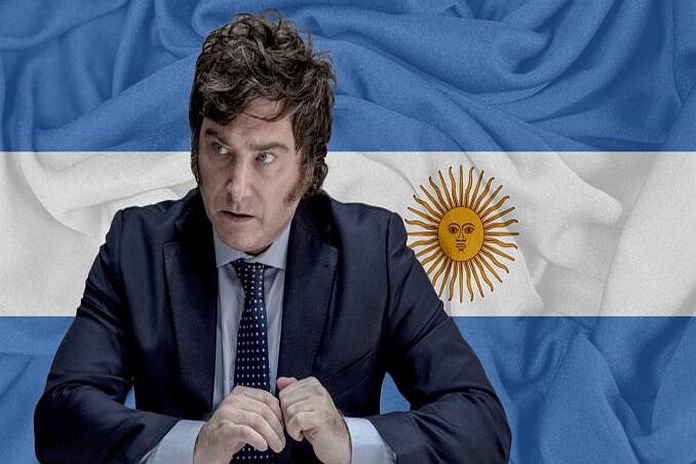MEXICO, CITY, Mexico, (venezuelanalysis.com) – Venezuelan officials categorically rejected efforts by Argentine president Javier Milei to promote sanctions against the country.
In a controversial interview with Andrés Oppenheimer on CNN aired Sunday, Milei lambasted various leaders in the region and expressed his interest in convincing other governments to impose coercive measures on Venezuela.
Venezuelan Foreign Minister Yván Gil responded harshly to the Argentine president’s threats, calling him a “spokesperson” for Venezuela’s wealthy far-right oligarchs who seek “invasions and sanctions.”
“The macabre expectations of the neo-Nazi will again fail, Venezuela is advancing at a good pace, and will defeat every effort by the imperial lackeys,” said Gil on social media. “Instead of wagging your tail for your masters, worry yourself about the internal affairs of your country, which are already quite tangled,” he added.
Milei’s comments drew a similar response by ranking Chavista leader Diodado Cabello, who nonetheless expressed little concern that the Argentine president is capable of following through on his threats.
“He doesn’t even have the strength to govern his country, [yet] he thinks he will have the strength to impose sanctions on Venezuela. He should govern his country, he should solve the problems in his country, which are numerous,” said Cabello, referring to Milei as a “fool.”
The diplomatic spat comes amid increased tensions between Venezuela and Argentina. Last month, Venezuela closed its airspace to flights to and from Argentina after the country handed over a Venezuelan state-owned Boeing cargo plane to the US government, which was subsequently destroyed.
Last week, the Argentina embassy in Caracas reportedly gave refuge to six Venezuelan opposition operators after the Attorney General issued arrest warrants over alleged involvement in coup attempts. There were unofficial reports that the Venezuelan Foreign Ministry had agreed to grant safe passage to the six so they could fly to Argentina.
The Argentine president’s statements come following controversial statements by various governments in the region that questioned the “integrity and transparency” of Venezuela’s electoral process that Caracas viewed as an act of interference.
Jorge Arreaza, former foreign minister and the current secretary-general of the ALBA-TCP bloc, said these statements were the product of an intense campaign led by the US Department of State.
“Although we all know that the vast majority were the product of pressure, calls and threatening messages from the US State Department, they must consider their concrete effects and consequences,” said Arreaza.
A recent report by the Washington Post stated that the Biden administration was seeking a way to limit Venezuela’s oil revenues without imposing a blanket prohibition. Following an agreement between the Maduro government and the US-backed opposition establishing certain conditions for the 2024 vote, the US Treasury Department issued a license providing a six-month waiver on dealings with Venezuela’s energy sector. That waiver is up for renewal later this month and US officials have floated the possibility of a snap back of sanctions over the disqualification of far-right candidate María Corina Machado.
Milei’s call for a regional sanctions strategy against Venezuela is reminiscent of the so-called Lima Group, the now defunct ad-hoc organization of right-wing governments formed in 2017 that sought to promote regime change in Venezuela at the behest of Washington.
The Lima Group ultimately failed to secure its objective and fell into irrelevance after a series of leftist and progressive leaders won elections throughout the region and opted to abandon the strategy that sought to isolate Venezuela.
Instead, it is Milei’s government that is finding itself isolated from its neighbours early on while in office. In his interview with Oppenheimer, Milei also criticized Mexican President Andrés Manuel López Obrador and Colombian President Gustavo Petro, calling the latter a “terrorist killer.”
In response, Petro ordered the expulsion of the Argentine ambassador to Colombia, though the two countries later clarified that they would not break diplomatic relations. Likewise, López Obrador clarified that despite the insults leveled by Milei, diplomatic ties would not be harmed.





